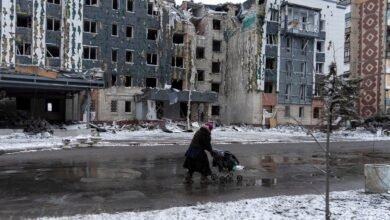Can Russia launch an assault on Ukraine’s city of Zaporizhzhia?

As Russian forces continue to gain momentum in Ukraine’s Donetsk region, Moscow could also be planning an imminent push further south, according to Kyiv, with fears rising over Zaporizhzhia. Does Russia have enough resources for this?
Earlier this week, Ukrainian President Volodymyr Zelenskyy said that Kyiv is tracking Russian troops in the Zaporizhzhia region, where it noticed “existing threats” — a statement that came following a report by his armed forces commander Oleksandr Syrskyi.
By Wednesday, Ukrainian soldiers had repelled an attempted Russian offensive in the Zaporizhzhia sector, Ukraine’s National Guard Commander Oleksandr Pivnenko said.
The city of Zaporizhzhia is situated just a little over two dozen kilometres from the current front line, with fears rising that it might become Moscow’s next target.
Russian troops took over around two-thirds of the Zaporizhzhia region in the first weeks of the full-scale invasion, but they were stopped at Vasylivka, a town 30km south of the administrative capital of the region.
Vasylivka served as the main checkpoint for hundreds of thousands of Ukrainians evacuating from the occupied territories of the Zaporizhzhia region, including the major rail hub of Melitopol, the Azov Sea coast settlements and the city of Mariupol.
Since February, Zaporizhzhia has welcomed over 275,000 internal refugees, which is a quarter of the city’s population pre-2022 invasion.
Over the past several weeks, Russia had significantly intensified air strikes against Zaporizhzhia, targeting its civilian infrastructure with guided aerial bombs.
Zaporizhzhia offensive and Kursk incursion
It is unclear when Russia could potentially launch its assault on the city of Zaporizhzhia if it plans to do it.
But according to the Ukrainian military, Moscow initially intended to do it much earlier if it wasn’t for Ukraine’s surprise incursion into Russia’s Kursk region this August.
The Economist, citing Ukrainian intelligence sources, reported earlier this week that Russian forces are preparing for a future offensive operation with up to 130,000 personnel against Zaporizhzhia.
However, the Washington-based Institute for the Study of War think tank (ISW) quoted a Ukrainian brigade commander who stated that the Ukrainian incursion into the Kursk region halted Moscow’s initial plans for an assault on Zaporizhzhia and that the Russian military command redeployed nearly half of the 20,000-30,000 Russian troops initially slated for the offensive in Zaporizhzhia region to Kursk.
The battalion commander noted that continued Russian efforts in Kursk may delay an offensive on the city of Zaporizhzhia and that Russian forces may also conduct the attack with a smaller force grouping than originally intended.
Does Russia have enough personnel for a new offensive?
Amid the intensified push in Eastern Ukraine, Russia last month suffered its most significant troop losses since the start of the war in Ukraine while making territorial gains, UK Chief of the Defence Staff Tony Radakin said, with “on average over 1,500 people either killed or wounded every single day”.
According to the General Staff of Ukraine’s Armed Forces, Russia’s daily casualties in Ukraine surpassed 2,000 for the first time on Friday.
The figures do not specify killed or wounded, though the overall consensus is that it includes dead, wounded, missing, and captured.
The exact figures for both sides are nearly impossible to establish as Kyiv and Moscow are secretive about their losses.
The last figure provided by Russian authorities was 5,937 killed soldiers as of September 2022.
As for Kyiv, in February, Zelenskyy acknowledged that 31,000 Ukrainian fighters had been killed.
The Economist released its estimates on Tuesday, saying between 60,000 to 100,000 Ukrainian soldiers have been killed since the beginning of Russia’s all-out invasion in early 2022, and 400,000 more are too injured to fight on.
Since February 2022, Ukraine and Russia lost a greater share of their population than the US during the Korean and Vietnam wars combined, data shows.
Additional sources • ISW, AP
Source link



